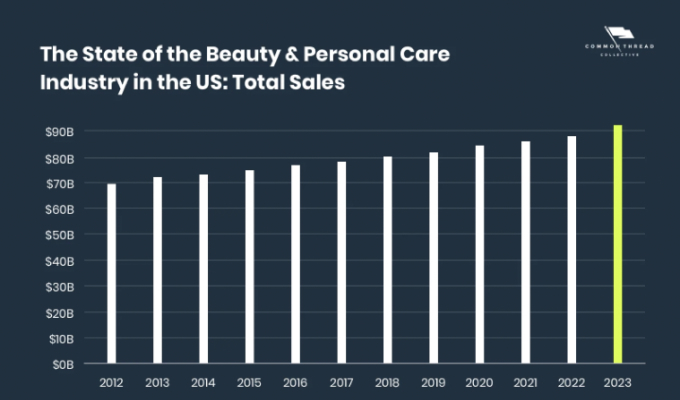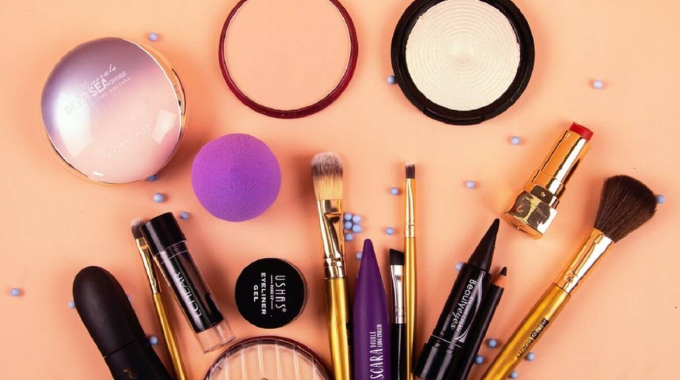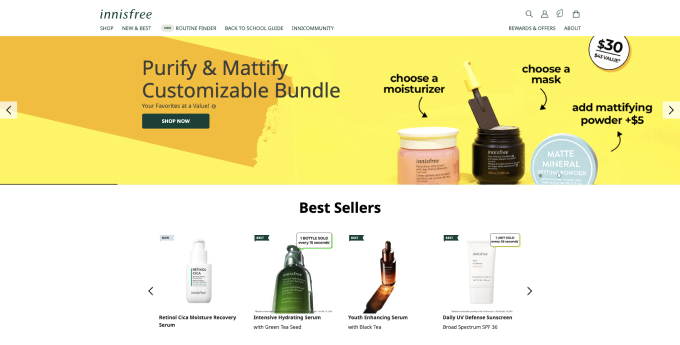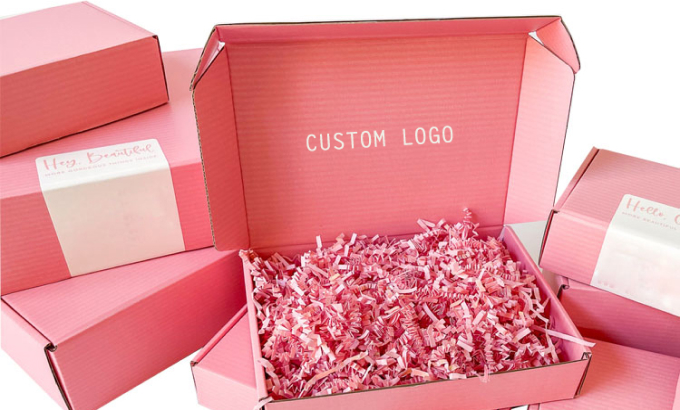Selling makeup online can be a pretty lucrative deal, but only if done right. Ready to sell makeup online and give wings to your entrepreneurial dreams? This is the only article you need to know the A-Z of running a makeup business.
This comprehensive guide explains how to sell makeup online as well as how to build an online makeup business from the ground up.
The makeup industry has been rapidly expanding since 2021. Previously, individuals preferred to buy makeup from physical stores. However, they are increasingly becoming receptive to the idea of ordering it from home and having it delivered to their door.
With the ease with which anybody can now create an eCommerce store, the eCommerce makeup business is becoming more popular than physical establishments that sell makeup. Entrepreneurs, therefore, are becoming more interested in selling makeup online rather than renting out shop premises, which have high overhead costs.

The beauty industry has been democratized over the last decade and is no longer dominated by a few large corporations. Nowadays, anyone with a basic understanding of makeup can sell it online. Whether it’s a BB lotion, lipstick, a new eye palette, or a new concealer shade, you can sell it online.
If you love makeup and want to boost your income, you can start selling makeup online. Many new professionals who sell cosmetics online have high-profit margins. First and foremost, you must understand how to sell makeup online.
How to Sell Makeup Online in 2022
1. Find a niche
The cosmetics industry is already vast, and the US market is predicted to increase at a rate of 3.5% each year. While this implies you have a potentially huge audience, it also implies that you’ll need to find a way to distinguish yourself from the masses of other people selling makeup products online.
Don’t strive to impress every customer, but select a particular niche to target. If you cast too wide a net, your products will fail to strike a personalized chord with anyone.
Think about what sets your brand apart from the already existing ones in the market. It could be anything along the lines of economically priced products, novelty makeup products (airbrush makeup etc.) or specialized makeup products.

Once you zero in on your USP, highlight it in all your marketing and branding endeavors.
Here are a few helpful tips to find your USP:
- Determine what value your product is providing. Think from a third-person perspective about whether or not you would want to carry the same product in your kit.
- Deduce what market gap your product fills. For example, there’s ample space for new products in the market in niches like sustainability, cruelty-free and anti-ageing niche if your product does something better or different than the already existing products.
- Focus on your target audience. Is your product something that will appeal to college kids? Or is it something that middle-aged women would be more inclined towards? Take into account everything from occupation, demography, age etc.
You can also make use of forums, google trends and keyword research to figure out what kind of products are trending in the market.
There are over 700 cosmetic brands on the market. If you want to compete in this industry, you must have something distinctive to offer. Research current beauty market trends and identify your target demographic.
Choose a product category and extensively review the products in it as well as the technologies utilized to solve consumer concerns. Here are some important cosmetics business trends to consider while choosing a niche:
- Vegan and cruelty-free cosmetics
- Cosmetics with color
- Chemical-free cosmetics

2. Do competitor research
Along with identifying your niche, you must assess your competition. You must ensure that your makeup products, prices, and quality of service are superior to those of competing online makeup retailers. If you want to boost sales and revenue, you must persuade customers that your brand is superior to others.
Address the following questions:
- Who are your major competitors?
- What do your competitors excel at?
- What are they bad at?
- What aspects of your online store, products, and marketing techniques can you improve to increase market share?
- What blunders did your competitors make, and how will you avert them?
Competitor research can aid you in boosting your brand’s market position. It will help you generate more prospects, conversions, sales, and profit in the long term.
3. Decide on your business model
There are numerous ways to sell makeup goods when it comes to launching an internet business in the cosmetics industry. You should decide on a business model that meets or exceeds your budget and resources.
Let’s take a look at the different types of makeup businesses you can launch.
Start your own makeup brand
You can start your own makeup brand by creating one-of-a-kind makeup products and selling them online. Lip balms, facial oils, bath bombs etc. are simple to make and can serve as a great starting point.
While you will be manufacturing the makeup products yourself, you must adhere to FDA rules for air control, ventilation, and surfaces.
You’ll need to set up a production unit as well as carefully document your process for replication if you want to create your products on a larger scale.
Manufacture your own products
You can also work with manufacturers to develop formulas for your makeup products. For this, you will have to research credible manufacturers and partner up with them to create your own line of original makeup products.
This entails looking for makeup manufacturers, either locally or internationally, who will collaborate with you to develop a unique line of products. This way you get to control every aspect of your product’s production while getting the required support in terms of overseeing the entire process.
This is also a great option as you get to brand all your products as “original”.
Sell white-label makeup products
Another option for starting an online cosmetics business is to buy products wholesale from popular makeup companies and sell them online after adjusting your profit margin. You can sell products from local businesses or organic or natural products.
This means you get to make minute changes in the original formula of the product; its color, fragrance etc. and label it as your own to sell in the market.
It sure might sound convenient, but it comes with a big drawback. Since you won’t be able to justify these products as “one of a kind” or “unique” it is going to be difficult in the long run to create credibility and consumer trust around them.
Resell
Flipping makeup can be incredibly lucrative if done right. There are platforms like Poshmark and Glambot that allow you to resell makeup that hasn’t been opened (and even used one in some cases.)
You can avoid the task of manufacturing makeup products by reselling them. However, you will need to contact vendors and find a supplier who gives the lowest prices and takes charge of shipment and customer service. In this manner, you won’t have to pay any money upfront to buy stock in bulk.
Dropshipping
Selling makeup doesn’t necessarily have to break the bank. Dropshipping is a great business model which allows you to sell makeup products without holding any inventory.
In dropshipping, you don’t own any products or ship any stock yourself. When you receive an order on your online store, you place an order with your supplier who takes care of everything from sourcing to shipping. The consumer will receive their order as if from your store, meaning they won’t get to know their order was dropshipped.
The biggest appeal of dropshipping makeup is that you don’t have to bear great costs upfront or bare expenses for storing your inventory. It has thus recently acquired popularity as an effective way to earn money with low overhead. You can start selling makeup online as a dropshipper and eventually extend to various methods of inventory management as your business grows.
4. Decide on a supplier
Whether you plan to manufacture, white-label, droship or resell your products, you need a pool of reliable suppliers to source your products.
Choosing a supplier for your business entails a lot of thorough research. Here are some pointers that can provide you with some clarity:
- The supplier and his processes are congruent with your vision of the brand. This becomes especially important when you are targeting vegan or organic makeup etc. You need a supplier who is willing to accommodate these requirements.You need to look into everything from how they are sourcing the products, what ingredients they are adding to what preservatives they use to ensure the longevity of the products.
- Supplier compliance in your country. Make sure your supplier is in compliance with all the required regulations. For example, for US-based businesses, your supplier needs to be compliant with the Federal Food, Drug, and Cosmetic Act (FD&C Act) and the Fair Packaging and Labeling Act (FPLA).
- Order prerequisites. Check if there is a minimum order or quantity that the supplier requires to process an order. It is advisable that you do not invest in an exorbitant amount at first. When establishing your brand and gaining clients, choose a supplier who allows you to invest in limited inventory.
5. Branding, packaging, and labeling
According to 70% of respondents in a survey, consistent branding is critical when interacting with customers. Your makeup products’ branding and labeling should be professional. You must use a distinctive brand name, logo, packaging, and labeling for your products.
Working with so many dynamic aspects may appear intimidating, but the idea is to pick one element, modify it thoroughly, and then simply sync up the other components to the same tone. This saves time while also ensuring that your branding is consistent.
Branding is not only about how you market your products. It’s also about how you market it, package it and even showcase it.
Let’s take a closer look at the different components of branding now:
Imagery
Begin with the imagery and colors associated with your brand. Once you finalise a color to represent your brand, you can incorporate the same. Colors are more significant than you believe. You may also utilize color psychology to match your brand’s colors to the preferences of potential purchasers in your niche.
Play around with fonts at this stage to determine what suits your vision for your brand the best, as this will decide how your other branding elements will end up looking.
Logos
Create a visually appealing logo and incorporate your colors into it for brand consistency. Logos is where you can utilize color theory to the fullest.
A lot of makeup brands utilize colors to subconsciously invoke trust in the minds of their users. For example, “Estee Lauder” uses blue to convey that their brand is trustworthy and reliable, while “Benefit cosmetics” use pink for promoting their products as feminine and nourishing.
Brand name
Make sure that you come up with a relatable, unique, and appealing brand name.
Your brand name is a representation of your brand, the morals behind it and the values it stands by. It plays a big role in how people are going to perceive your brand and sets expectations for them.
Make sure you carefully select a name for your brand that sets it growth trajectory.
Packaging
To some extent, the packaging of a makeup product also creates a competitive advantage. If you use low-cost packaging, you will wind up spending more in the long term. Cheap packaging increases the likelihood of product damage during transportation and does not appeal to people from all walks of life.
Packaging is important not just for safely shipping your products, but also for providing customers with an enjoyable unwrapping experience. Make your packaging engaging and stylish, and include your brand logo and graphics to improve customer experiences.
Apart from packaging, pay special attention to how you are labelling your products. Labeling entails keeping track of your country’s or state’s legal obligations. They would expect you to include information such as safety and allergy recommendations, ingredient lists, statements or claims made on packaging, etc.
6. Decide where to sell makeup online
The issue of selling cosmetics online is finding an audience and building trust in your brand so that people will buy your items without being able to try them.
The following are the best options for selling makeup products online:
Social media
You can set up Facebook or Instagram shops to sell makeup directly to your customers on social media. Instagram has a sizable influencer community.
One of your business prospects is to work with influencers who might review makeup products and promote them to their audiences. Choose influencers who share your brand’s values.
For example, if you sell organic makeup, find influencers who support the same beauty philosophy.
Marketplaces
The most successful marketplaces, such as eBay and Amazon, provide millions of buyers with a diverse choice of product categories, including makeup.
It is a safe option to consider since these marketplaces already have a vast audience. Joining a marketplace network can be an effective way to reach a large audience at the outset of a business.
As these platforms are densely populated, you will have to compete with a lot of sellers marketing similar products, even at lower prices. This makes scaling your business into a brand difficult when selling on marketing.
Online store
Creating an online store allows your company to develop a brand image and maintain strong communication with clients. With complete control over all business operations, you may implement personalization on your website, create a distinctive brand design, provide consumers with specialized support, and arrange a personalized experience to win over the choosy crowd.
The biggest benefit if selling your makeup products online with an online store is that you are immune to platform algorithm changes and don’t have to worry about the maintenance and upkeep of the store. When it comes to selling makeup online, this makes it the most popular option.
With Dukaan, you may start selling your makeup goods online right away. Dukaan will aid you in developing your online store without the need for any coding, making it the easiest way to get started.
Dukaan provides features such as safe payment options, a pleasant user experience, customer care, shipping, and marketing tools, in addition to building a visually appealing store for you.

Launch, scale and manage your online business with just $14.99 on Dukaan. Annual plans start at $149.99 only.
7. Ship your makeup
Once you’ve completed your inventory and online store, it’s time to work out how to ship your cosmetics to customers. When broken down into steps, shipping can be quite simple.

Set the source address: The address from which you ship products is critical since it impacts how tax is calculated. In most circumstances, the source address will be your residential address or the address of the workshop or office area from which you operate.
Consider the destinations: Shipping charges vary based on whether you’re shipping local, nationwide, or overseas. To specify geographical limits, you can define “shipping zones” with various rates based on postal code, state, or nation.
Make sure customers are aware of their options: Customers should be informed of shipping prices before proceeding to the checkout process; some last surprises can be inconvenient! You can provide three major shipping options: precise shipping (charging the actual cost it takes to ship with carriers), flat rate shipping (simpler, predetermined pricing that you’d apply to all orders within the US), and free delivery (you can apply this to all products or offer it as a perk for purchases above a certain amount).
Choose a courier: Use dependable and experienced courier services to guarantee that your makeup products reach your customers in perfect condition.
8. Market your makeup business
Now that you understand how to sell makeup online from home, you must understand how to market it effectively. Here are some marketing strategies to consider.
Make use of personal recommendations
Consumers have learned to tune out traditional marketing channels and instead rely on the recommendations of family, friends, and influencers.
Leveraging your customers’ networks is an excellent marketing strategy for increasing brand awareness and obtaining profitable business referrals.
Give your customers incentives to share your goods on their social media profiles. This allows you to tap into their network of family and friends, amplifying your promotional efforts and generating new business through personal endorsements.
Nothing helps build credibility and trust around your brand better than user-generated content and word-of-mouth from them vouching for your products.
Influencer marketing
Around 63% of customers trust influencer messaging more than brand messages. Therefore, influencer marketing is a great avenue for a digital brand since customers will be offered your products by an individual they already trust.
The first step in starting with influencer marketing is deciding which platform(s) to market on. There are various options, ranging from Pinterest and Facebook to Twitter, but given that 83% of makeup businesses work with Instagram influencers specifically, we recommend the photo-sharing platform as the best place to begin.
There is also room for a lot of flexibility with influencer marketing. In exchange for products, exposure or monetary compensation, you can strike out a deal with an influencer of your choice and stature.
Before you select an influencer, research into their niche, the type of audience they cater to and the hashtag they use in their posts.
Request product reviews from experts
Another strategy for marketing your makeup brand is to have industry experts review your products. Many gurus or experts run their YouTube channels and other accounts on social media with a large following.
You can request them to add your makeup products to their list of ratings and reviews. This would allow your products to easily reach their huge number of followers.
Hold giveaways
Giving something away as a “thank you” to customers can go a long way. Whether it’s a free sample or merch, research shows that free add-ons encourage repeat sales. It will most likely make your customers happy because, let’s face it, who doesn’t like something for free?
Keep up to date on the current developments in the cosmetics eCommerce industry so that you may adjust your marketing strategy accordingly.
Social media
Since social media is the simplest approach to increasing word-of-mouth advertising, most firms are actively utilizing it. Currently, at least 96% of cosmetics companies have a social media presence. The ability to interact with your audience is the fundamental benefit of having a social media presence.
In order to build a following, you can start by following well-known users and pages in your specific niche and engaging with them. You can also pin, tweet, publish, and share relatable original or user-generated content to promote your brand on social media platforms.
The user-generated content we talked about it, social media is the best place to showcase it, apart from your store’s testimonial section.
SEO
SEO helps your store rank on search engines like Google so they show up on top on the search engine’s results page. To make your store visible to your customers, you need to have a really strong SEO game.
There are some very simple SEO techniques that can help your store rank better. Some of them include:
- Make your webstore mobile-responsive and optimized for speed. In terms of SEO, the faster the loading speed, the better.`
- Write clear, concise and engaging meta titles and content for your product pages.
- Add alt text to your images.
- Align your keywords with the search intent.
- Make your URL SEO friendly.
FAQs
1. How do you sell beauty products to clients?You can sell beauty products to clients by advertising over social media, running ads and not to forget, influencer marketing. It is foolproof to sell your beauty products to clients through your own online store using platforms like Dukaan, since you don’t have to worry about competitors.
2. Can you dropship makeup?
Yes, it is possible to dropship makeup. Infact, dropshipping makeup will allow you to sell a wider variety of makeup products without breaking the bank. All you need to start dropshipping in the makeup niche is your online store (eCommerce platforms like Dukaan can help with that) and a steady pool of suppliers.
3. Where is the best place to sell beauty products online?
You can sell beauty products online in multiple places: marketplaces like Poshmark, social media like Instagram and online store using an eCommerce platform to build a store. Out of these, we advise selling using your own store to scale your business to a brand.
4. Is selling makeup a good business?
Makeup has consistently been a profitable business niche throughout the years. Research shows that there’s a profit margin of 40% to 80%. So yes, selling makeup is both an evergreen and a profitable business idea.
5. Can I make a living selling makeup online?
Yes, you can absolutely make a living selling makeup online, but only if you play your cards right. You’ll have to continuously put efforts into scaling your business online, dabble into different business models, formulate cost-minimizing strategies and most importantly, strive to convert your business into a brand. Over time, this will allow you to stabilize your income.


Leave a Reply
You must be logged in to post a comment.